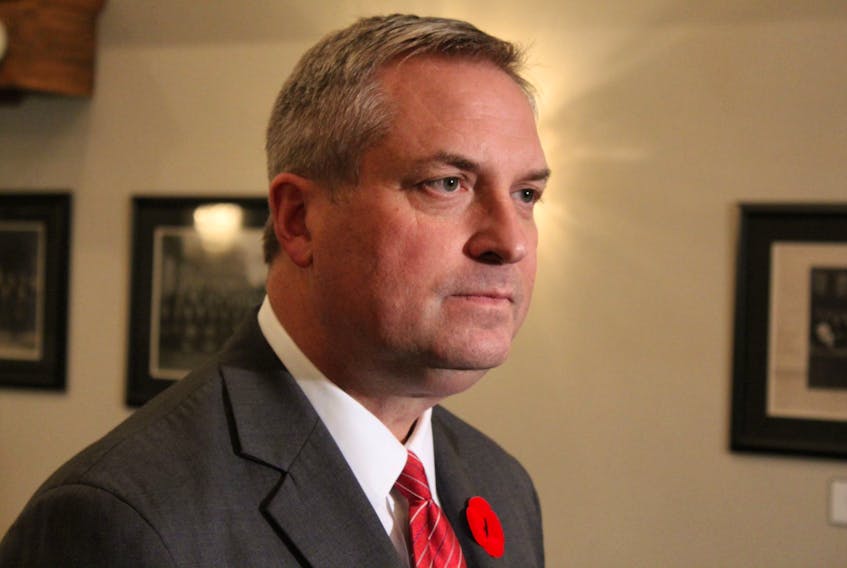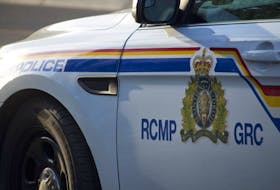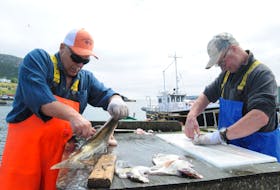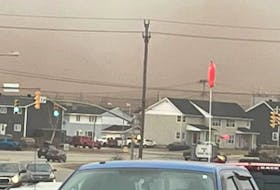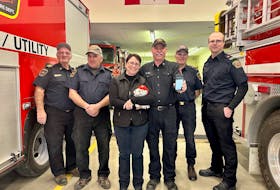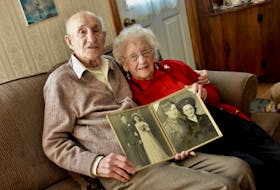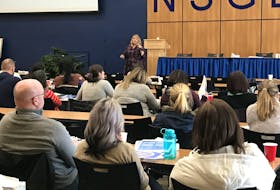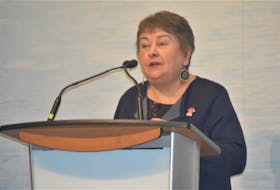ST. JOHN'S, N.L. — When St. John’s Centre NDP MHA Jim Dinn asked Fisheries and Land Resources Minister Gerry Byrne whether or not Northern Harvest Sea Foods had a plan to deal with warm water events like the one that recently killed 2.6 million fish on the south coast, Byrne accused Dinn of marginalizing indigenous people.
Byrne accused Dinn of a pattern of behaviour that marginalized the voices of indigenous people.
Byrne characterized comments made at a meeting of the Salmonid Association of Eastern Newfoundland (SAEN) during Dinn’s time as president of the association.
The following is an excerpt of a scrum with Byrne on Thursday:
Byrne: "In June of 2018, I as engaged in a meeting with Mr. Dinn and several members of the executive of (SAEN). In June of 2018, 16 members of the executive met with me to discuss issues around recreational salmon angling. During the course of that meeting … we were discussing who would be involved, who would be invited, who would participate in the Department of Fisheries and Oceans salmonid advisory council meetings. I raised the point, and I remember this – it’s indelibly marked in my mind – that indigenous peoples, first nations have a right and an expectation to participate and that I welcome that participation. I was not invited myself, but it was said that I did not have the science background in salmonid ecology. I made the point that Western science has a strong role to play, but as well indigenous tradition and knowledge has a strong role to play. This is where it gets very, very regrettable. At that point in time, a member of the executive of the (SAEN) spoke up and said, ‘Yes, you have to kowtow to indigenous people.’ This was a very, very regrettable remark."
Reporter: "Was that Mr. Dinn?"
Byrne: "One of his executives said that. Then, followed by muted laughter from within the room. And then, it was at this point in time that Mr. Dinn spoke up and said something to the effect of, ‘I think what he meant was that they have a lawful right to be in the room.’
I said that was not acceptable language. I stopped the conversation at that point in time and said this is not an acceptable way to proceed.
(Crosstalk): …
Byrne: "Allow me to finish. So then, the conversation stopped, I said this is not acceptable and Mr. Dinn continued on with the reference to some sort of legal requirement for indigenous people to be involved. I said that was not acceptable. Then, there was a reflection of the withdrawal of a remark.”
Byrne says he is relying on his own recollections and his own records for his comments.
Asked about the incident, Dinn said Byrne is trying to find ways to dodge questions.
“I was in the room when a comment was made, but I think Gerry, to assume that somehow reflects on me, is yet another example of a minister grasping at straws to avoid answering questions and maybe cover up his own dereliction of duty in this salmon die-off,” he said.
Dinn said he recalled the incident, and noted that the person who made the comment was removed from SAEN shortly thereafter.
Byrne has suggested the person remains on the executive of the organization, citing SAEN’s website. The website still lists Dinn as president of the association, but Dinn resigned the position upon winning election in May, suggesting the information online is not up-to-date.
“That was a comment that caught the board members that were there off guard. The recollection is the person did make a comment about how the attendance of some DFO in-land compliance meetings, that somehow the presence of indigenous representatives at these meetings was somehow ‘kowtowing’ to indigenous groups,” he said.
“I made it very clear in that meeting that indigenous people have a right to be at these talks, to legislation and by virtue of the fact that they inhabited this land first. Secondly, the comments of the individual do not reflect the position of SAEN at all.”
Progressive Conservative Leader Ches Crosbie says Byrne was out of line with his accusations against Dinn.
“I think the sentiment on our side of the House was that (Byrne) went overboard in delivering a slur against Mr. Dinn,” Crosbie said.
“Really, it was a slur because it not only implied, it stated he had made inappropriate comments about indigenous people before without specifying circumstances. I think that’s out of order, for sure.”
Crosbie’s caucus was also targeted by Byrne in question period.
When Mount Pearl North MHA Jim Lester asked Byrne about a ban on farmers shooting moose that wander upon their property, Byrne responded with this, taken from Hansard, on Thursday: “So, I'm not sure who the honourable member for Mount Pearl North is referring to, but if he has any evidence, any information about poachers and poaching activity, which he seems to be endorsing, he should report it to the authorities. Then again, maybe this honourable member is not always on the side of the law himself. I don't know, but what I can say is that he really needs to be more cautious and careful about hunting at night.”
All of this was sparked when Dinn asked whether a redacted access to information request indicated Northern Harvest did or did not have a plan to deal with warm-water events, like the one that reportedly triggered the 2.6 million salmon die-off in August on the south coast of the island.
In the scrum, Byrne did answer the question.
“They were required to speak to whether they could develop a plan. They spoke in broad, in general terms about a plan. What was missing was a prescription as to how to deal with specific events,” he said.
"They were required to offer a general plan, that included … in their applications they noted that if a warm-water event occurred they would under their own standard operating procedures reduce activity on the site.”
Byrne wouldn’t say whether he thinks the company did enough to prepare for such events, saying the investigation by the Marine Institute is ongoing.
The Telegram has contacted the Miawpukek First Nation for comment on the matter.

